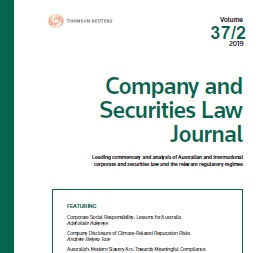*Please note that the links to the content in this Part will direct you to Westlaw AU. If you are still using Legal Online, the links can be found in the LOLA PDF at the bottom of this post.
The latest issue of the Property Law Review (Volume 3 Part 1) contains the following material:
Articles
The continued relevance of servitude – AJ van der Walt
The word “servitude†refers to servitudes or easements in land, but it also shares an etymological history with serfdom. This article explores two narratives in which the effects of the abolition of feudalism in modern servitude law are explained in terms of the promotion of liberty; one focusing on the numerus clausus principle as a strategy to promote a unitary notion of ownership and to prevent the fragmentation of ownership, and the other focusing on the promotion of efficient land use. The article argues that both narratives have to be complemented by a normative perspective that emphasises the civic or democratic aspect of liberty.
To purchase this article, complete the Individual Article Sale order form and email it to [email protected].
Lockean natural rights and the stewardship model of property – Helena Howe
The stewardship model of property provides a duty-based alternative property concept that is increasingly recognised as providing a more effective framework within which to tackle a range of social and environmental challenges. Lockean property theory is traditionally understood as supporting an extensive rights model of property and, as such, is potentially in conflict with the stewardship model. This article seeks to demonstrate that the stewardship model does not involve the problematic denial of Lockean natural rights to property. It considers the similarities between the model of property justified in accordance with Lockean principles and the model of stewardship.
To purchase this article, complete the Individual Article Sale order form and email it to [email protected].
The pursuit of happiness: Implementing utopia through the New South Wales community title legislation – Kunal Sharma
This article analyses the phenomenon of intentional communities, and evaluates how effectively the New South Wales community title legislation can be used to implement, in practice, such communities. In doing this, it identifies the multifarious tensions that intentional communities give rise to: between the individual participants and their community; and between the community and broader polity. In light of these tensions, this article assesses the practical value of the New South Wales community title legislation in realising the “utopian†aspirations of intentional communities. It concludes that the New South Wales community title legislation is an effective way of establishing intentional communities, as it enables security of shared physical space and confers legal form on the community’s shared values, subject to some justifiable restraints. The sustenance and harmony of the community, however, ultimately depend on the mandates of the community and the cohesion of the participants.
To purchase this article, complete the Individual Article Sale order form and email it to [email protected].
For the pdf version of the table of contents, click here: LOLA – Prop L Rev Vol 3 Pt 1 Contents or here: WAU – Prop L Rev Vol 3 Pt 1 Contents.


